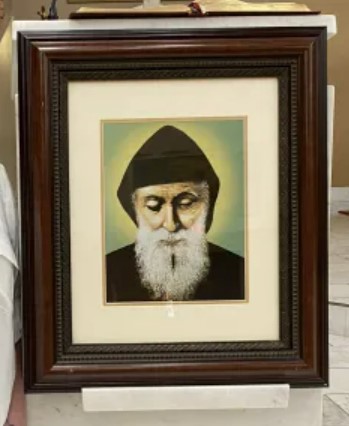
by catholicnewsagency.com — Joe Bukuras — Phoenix, Ariz. Dafne Gutierrez, of Phoenix, Arizona, will never forget the traumatic experience of gradually losing her vision. The 37-year-old mother of five was declared legally blind in 2014 after two years of gradual sight loss caused by chronic brain swelling. When she couldn’t see at all, she was devastated. Describing the experience of total blindness, she told CNA,”You don’t see anything. You just don’t.” “What hurt the most is that I had little ones, and I had to depend on them,” she told CNA in a Sept. 30 interview at St. Joseph Maronite Catholic Church in Phoenix.
Gutierrez, who was not fully committed to her Catholic faith before losing her vision, soon found herself desperately seeking the restoration of her sight through healing Masses at several Catholic churches in the Phoenix area. None of those healing Masses brought her sight back, and she was losing hope. But her sister-in-law pushed Gutierrez to give it one more try: this time, at a Maronite Catholic church where a relic of the famous Lebanese hermit, St. Charbel Makhlouf, was on display for veneration. As a woman of Mexican descent, Gutierrez says she would never have thought of going to what is largely a Lebanese-populated church. But now, with her 20/20 vision restored, she knows why she was there.
Living life without sight
Gutierrez said that when she was declared legally blind, she begged God to bring her sight back for her children’s sake. “My prayer was always ‘I’m here, God. Hear me out. If you don’t want to do it for me, fine. But do it for my kids.’” Living without sight for two years drastically changed Guitierrez’s lifestyle. She had a cane. She needed to be accompanied everywhere she went, and she had developed severe anxiety trying to adjust to only using four senses. But her physical lifestyle was not the only aspect of her life that was transformed due to her blindness. She rediscovered her faith, as well. Gutierrez said she stopped going to confession in 2015 shortly after becoming blind. She didn’t want to go back because she felt she wasn’t ready to turn away from her sin and do what God was asking of her.
Her sister-in-law, Maria Preciado, constantly reminded Gutierrez and her husband to go to confession, but Gutierrez always declined. Preciado’s perseverance, however, would prove successful, as she was the one who took Gutierrez to the many Catholic churches in the area to seek healing — healing that would eventually come, both physically and spiritually.
In January 2016, a first-class relic of St. Charbel Makhlouf — a bone fragment from one of the most popular saints in the Maronite church, known for his many reported miracles — was on display for veneration at St. Joseph Maronite Catholic Church in Phoenix. St. Charbel, whose feast day is July 24, was born in Lebanon in 1828 and ordained as a Maronite priest in 1859. In 1875 he became a hermit and died on Christmas eve in 1898. He was canonized in Rome on Oct. 9, 1977 by Pope Paul VI. Father Wissam Akiki, pastor of the church, was celebrating Masses all weekend in honor of the saint and blessing parishioners with healing oil. Preciado visited the relics on Jan. 18 and thought that Gutierrez could benefit from doing the same. So she invited Gutierrez and her husband to go. The couple went that very day.
Gutierrez remembers sitting in the pew and praying to God again for healing: “This is the last time, please hear me out. Don’t do it for me. Do it for my kids.’” Preciado, who was accompanying Gutierrez and her husband, went to the priest and asked him to give Gutierrez a blessing. The priest asked Preciado if he could hear Gutierrez’s confession before the blessing. So Preciado said yes. When Preciado told Gutierrez that the priest wanted to hear her confession, Gutierrez told her “no.” Gutierrez recalled that her sister-in-law’s response was: “No, I’m not asking you if you want to go, I’m taking you.” Preciado told Gutierrez to “get up.” So Gutierrez got up.
Preciado walked Gutierrez over to the confessional and she confessed her sins for the first time since before her marriage. The priest told CNA that after Gutierrez’s confession he gave her a blessing, put holy oil on her, and invited her to venerate the relic. Akiki said that the following Monday he received a call from Gutierrez. “She told me, ‘Father, can I come visit you?’” Akiki remembered asking, “Who’s going to drive you?” “She told me, ‘I can see,’” he said. He then told Gutierrez, “Praise be to God. I’m waiting for you.”
God healed her heart first
Gutierrez drove herself to the interview with CNA and drove herself home. She walked around the church with ease and had no problem opening and closing doors with the handles. She says she knows that God healed her through the intercession of St. Charbel. She still prays to him, even now, she said, almost seven years later. She and her daughter take a trip to the confessional every two weeks and go to Mass each Sunday. Before God healed her eyes, Gutierrez said, he healed her heart through confession. “The only thing that I can tell people is to keep on praying. God does hear us,” she said. “Go to confession,” she added, “because confession will take you to healing.”



